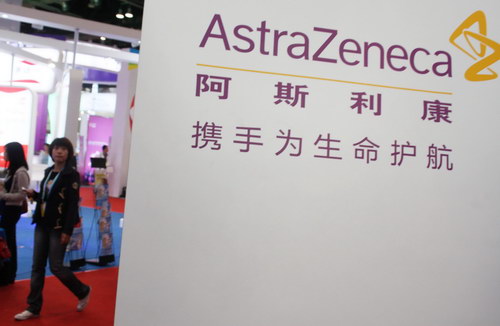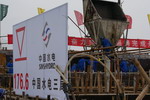AstraZeneca relies on partners
Updated: 2011-09-23 09:29
By Liu Jie (China Daily)
|
|||||||||||
|
An AstraZeneca Plc booth in an expo at Beijing. The pharmaceutical company will maintain its focus on research and development in China. [Photo/China Daily] |
Drugmaker sees local cooperation as key to serving Chinese market
BEIJING - AstraZeneca Plc, the world's seventh-largest pharmaceutical company by revenue, will continue its cooperation model on research and development (R&D) in China instead of merger and acquisition (M&A), the company's executive said on Sept 22.
"In China, our collaboration strategy is to forge partnership with leading academic and medical institutions that already have in-depth expertise in Asia-specific diseases. These partnerships are helping us solidify our presence in China ... access the best science across the region ... and ultimately bring the most value to patients," said Steve Yang, AstraZeneca vice-president and head of R&D for Asia and emerging markets.
"We believe it's important to innovate based on our own capability, not just buying new capability, (since) we are always interested in new product ideas. We are open-minded about different collaboration structures, but we believe we have unique capabilities and focus on those we can bring to the table," he said.
The London-based drugmaker has a product portfolio for diseases areas including cancer, cardiovascular, gastrointestinal, infection, neurological, respiratory and inflammation.
Concerning its criteria for choosing partners, Yang said a successful partnership requires a shared vision, complementary strengths, a genuine respect for each other's value, quite a bit of patience and a willingness to get creative and move beyond traditional models.
In 2010, AstraZeneca launched a five-year partnership with Peking University to accelerate the R&D work on therapies for obesity, diabetes and atherosclerotic heart disease. The collaboration aims to establish an academic platform for research in these areas, with emphasis on the specific needs of people in China.
Foreign pharmaceutical companies are speeding up their R&D in China to meet the specific demand of local patients, while M&A and collaborations are popular models.
Early this year, the Swiss pharmaceutical manufacturer Novartis International AG acquired an 85 percent stake in Zhejiang-based Tianyuan Bio-Pharmaceutical Co Ltd for entering China's human vaccine sector. Also this year, France-based Sanofi-aventis SA bought Hebei-based BMP Sunstone Corp for approximately $521 million, eyeing the domestic counterpart's pediatrics research, products and sales network.
But whether it's cooperation or M&A, the goal is to tailor the product to local demand, said Guo Fanli, an analyst from the Industry Research Center at China Investment Consulting. Guo added that foreign companies are expanding their presence in China not only with their mature products, which were introduced from developed markets, but also by developing new medicines for local patients, with different physical conditions.
China is expected to officially issue its 12th Five-Year Plan (2011-2015) on the pharmaceutical industry this quarter. According to insiders, it will encourage innovation in Chinese drug companies. And the government will offer supporting funds of 40 billion yuan ($6.26 billion) for domestic biopharmaceutical R&D.
Yang said that's "a high-level favorable trend because it enables and supports innovations".
"I think (the policy) offers great opportunities to those innovations in our own labs or through collaboration with anyone - not only domestic Chinese companies," he said.
AstraZeneca announced a $100 million R&D investment in China in 2006. So far, an innovation center focusing on discovering and developing new treatments for diseases that have high prevalence in Asia, such as stomach and liver cancer, has been operating in Shanghai. And a clinical operation hub was opened in February in Shanghai, increasing the speed of handling global clinical studies of its drug candidates.
Dong Yue contributed to this story.
Related Stories
Alliances form in growing pharmaceutical market 2011-08-03 15:13
China to spend 2.2% of GDP on R&D by 2015 2011-03-05 10:46
- Hurun shows property is still key to riches
- Chinese IPOs to hit record in Germany
- Trade with Arab states sets H1 record
- Car Free Day fails to get traffic off roads
- Liquidity remains tight despite cash injection
- China's manufacturing continues to contract in Sept
- Billionaires shy away from rich list
- China leads in carbon capture, says IEA














